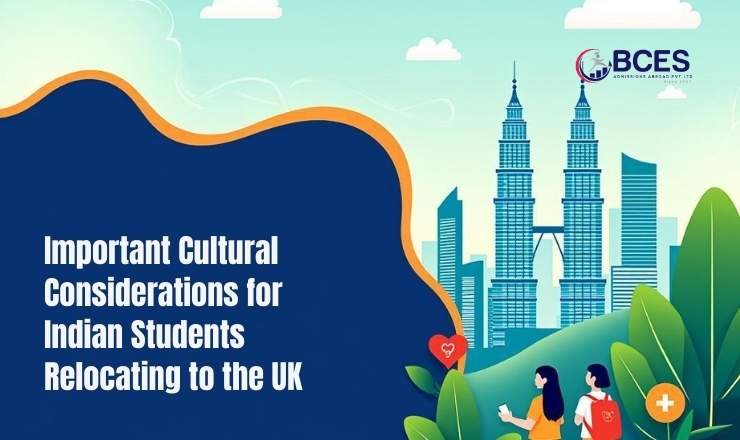Important Cultural Considerations for Indian Students Relocating to the UK

18 September 2025
Going abroad to study is both engaging and comes with the necessary obligations and adjustments. For students studying in the UK, it is second only to preparing documents, and applying to and choosing an institution to prepare for, to also consider cultural differences. Although both India and the UK have exciting traditions and quality educational systems, differing daily living approaches, ways of communication and the educational environment may feel very different.
At BCES Admissions Abroad, we highlight the role of cultural preparation in the success of a student in a foreign environment. Recognizing these cultural differences not only helps to avoid embarrassing situations, it also promotes the establishment of credible friendships, improved scholarship, and real feelings of belonging in a foreign land.
Communication and Social Behaviour
For the Indian scenario, dialogues tend to be typically lively, spirited, and often involve the culture of narration or sharing of personal experiences. Members can interrupt to show their interest or involvement. Although people in Britain communicate with politeness, reserve and sometimes silence, British culture also has a tendency to use “dry” humor or even understatement, to make a point. Whether visiting classes or speaking with strangers in the UK, it is better to listen and wait for people to finish speaking and demonstrate what good listening means while respecting people’s positions.
Academic Expectations and Teaching Style
UK teaching promotes critical analysis, autonomy in research, and active involvement. British lecturers require their students to exchange discussion, question concepts, and take part in debate. Group projects and giving talks are typical, so collaboration and again, time management are important. It is recommended that you prepare in advance for seminars/large lectures to impress and gain the benefit of your study in the UK experience.
Lifestyle and Etiquette
Indian culture is community based, and families, friends and neighbors often play a significant role in the experience of life from day to day. The UK culture is individualist with values leaning towards privacy. It is customary to schedule visits before dropping over to someone’s house, or a short text or call should precede a visit. Being on time for appointments here is of great importance; this includes classes, job interviews, social events, or simply showing up to what might seem like an informal gathering. While an hour or two late may be acceptable in India, here in the UK being on time shows professional respect. Adjusting to being on time will serve you well as you seek to make an impression on other students and within the professional workplace.
Food and Daily Life
Indian food is characterized by its spicing, variety and communal eating style. In comparison to Indian food, food in the UK is much less spicy, and staples such as meats, potatoes, and bread often constitute much of the meal. The current day offers a large variety of menu items for vegetarians and vegans, and almost every city has Indian stores. Being able to bring your own food provides a double benefit; not only do you get to enjoy a taste of home cooked food, but you will also save money as you experience new tastes.
Festivals and Rituals
Festivals of India—Diwali, Holi, Eid, and so forth—are celebrated via vibrant colors, music, and large crowds. Christmas, Easter, and New Year are the UK’s main celebrations. British universities are incredibly multicultural, so Diwali nights, Holi festivals, or Indian student associations including traditional events are typical. It enables the students to celebrate their background comfortably yet to learn something novel.
Employment and Economic Self-Sufficiency
A considerable proportion of UK students work part time to manage their financial responsibilities while also obtaining valuable work experience. International students can also work part time during term time and full-time during break times. Having a combination of work experience and study can help students gain confidence, independence with money, and improve their future employment opportunities. BCES Admissions Abroad can support students with understanding the rules regarding work for international students in the UK to help with planning in advance.
Why Understanding Culture Matters
Familiarity with cultural differences reduces homesickness, boosts self-confidence, and prepares individuals for potential global activities. In the United Kingdom, graduates showing versatility and global-mindedness are favored by employers. Merging the warmth and hospitality typically identified with Indian culture and the UK obsession with autonomy and professionalism can nurture a fulfilling and lucrative experience abroad.
At BCES Admissions Abroad, we are not merely consultants. We educate students for all aspects of studying in foreign countries—from choosing universities to settling into a different way of life. If you are willing to start your adventure to pursue studies in the UK, call us now for professional aid and custom advice.
Frequently Asked Questions (FAQs)
Yes. Indian associations throughout the UK and universities hold Diwali, Holi, and all the other festive occasions that bring the student closer to home.
Although British cuisine can be basic compared to Indian food, Indian grocery stores and restaurants can be found in many cities. Also, culinary preparation at home is the best opportunity to mix the two cultures.
British learning methods prioritize discussion, self-study, and critical examination over the simple listening to lectures.
Most Indian students are proficient in English to some extent, but to cope up with British slang and British accent may take them some time.
Very important. If you’re running late for classes, work, or social occasions, it’s typically seen as rude.
Yes. Part-time during term times and full-time during vacations is acceptable for allowing expenses to be controlled and gaining exposure. UK internship placements, UK teaching qualifications.